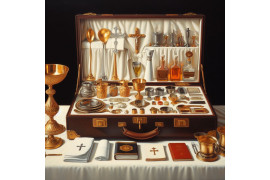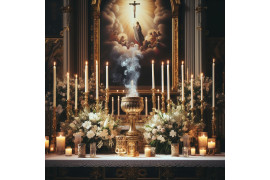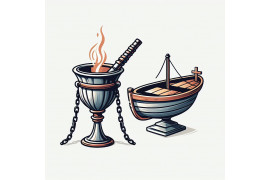Incense has been an integral part of Christian liturgy since ancient times. Early Christians adopted the use of incense from Jewish traditions, where it was used in worship and sacrificial rituals. In the context of Christian worship, burning incense holds symbolic significance, representing prayers rising to heaven. This practice is deeply rooted in the belief that the aroma of incense creates an atmosphere conducive to prayer and meditation.
But what about its usage specifically within Catholicism? Are Catholics allowed to burn incense during their religious ceremonies and personal devotions? We will examine historical precedents, theological perspectives, and current guidelines to gain a comprehensive understanding of whether burning incense aligns with Catholic beliefs.
Join us as we navigate through this intriguing topic within the realm of Catholicism.
Symbolism of Incense in Catholicism: Refusal to Offer to False Gods
In Catholicism, the burning of incense holds significant symbolism. It serves as a powerful statement, representing the refusal to offer worship to false gods and idols. This practice emphasizes the exclusive devotion and adoration that is reserved for God alone.
The aroma of incense fills the air during Catholic liturgical ceremonies, creating an atmosphere that engages multiple senses. The sweet fragrance wafting through the church is a reminder of the sacredness and holiness associated with worship. It symbolizes purity, sanctity, and heavenly presence.
When incense is burned in Catholic rituals, it releases smoke that rises towards heaven. This visual representation signifies prayers ascending towards God's throne and serves as a physical manifestation of spiritual offerings. The rising smoke also symbolizes purification and cleansing, as it carries away impurities or sins.
Moreover, the use of incense in Catholicism can be traced back to biblical times. In the Old Testament, we find numerous references to incense being used during religious ceremonies (Exodus 30:34-38). The Book of Psalms also mentions offering incense as an act of worship (Psalm 141:2).
The significance of incense in Catholic liturgy extends beyond its symbolic nature. It plays a practical role by helping create an ambiance conducive to prayer and reflection. The scent helps focus one's mind on spiritual matters while enhancing the overall sensory experience.
While burning incense holds great importance in Catholic tradition, it is essential to note that its use should not be misunderstood as idolatry or worship directed towards the physical object itself. Instead, it serves as a tool for deepening one's connection with God and expressing reverence.
To summarize:
Burning incense in Catholicism signifies the refusal to offer worship to false gods.
It represents exclusive devotion and adoration given only to God.
The aroma of incense is a reminder of the sweet fragrance of holiness.
The Role of Incense on the Altar in Catholic Worship
Incense plays a significant role in Catholic worship, particularly during Mass and other sacraments. It is not just a random addition to the proceedings; rather, it holds symbolic meaning and serves as a sign of reverence. When placed on the altar, incense becomes an offering to God and creates a sacred atmosphere through its fragrant smoke.
Incense as an Offering and Sign of Reverence
In Catholicism, the altar is considered a holy place where the Eucharist is celebrated. Placing incense on the altar signifies offering it to God as an act of worship and devotion. It symbolizes our desire to honor Him and acknowledge His presence in our midst. The use of incense during Mass also reflects the biblical tradition of offering incense in religious ceremonies.
Creating a Sacred Atmosphere
The smoke produced by burning incense has a profound impact on the environment during Catholic worship. As it rises, it envelops the space with its fragrance, creating an ambiance that is both reverent and mystical. The swirling smoke can be seen as representing our prayers ascending to heaven or as a visual representation of God's presence among us.
Enhancing Spiritual Experience
The use of incense enhances the spiritual experience for both clergy and worshippers alike. For priests, deacons, and other ministers who handle censers (containers for burning incense), it adds solemnity to their actions as they swing them back and forth during certain parts of the liturgy. This ritualistic motion further emphasizes reverence towards God.
For those attending Mass or participating in sacraments, inhaling the aroma from burning incense can have a calming effect on their minds and hearts. It helps create an atmosphere conducive to prayerful reflection and aids in focusing one's thoughts on divine matters.
Burning Incense as a Call to Prayer and Connection with God's Presence
Burning incense has a significant role in Catholic worship, serving as a call to prayer and fostering a sense of connection with the presence of God. The act of lighting incense is more than just creating fragrant smoke; it holds deep spiritual meaning for Catholics.
Lighting Incense: A Call to Prayer
When incense is burned during religious rituals, it acts as an invitation for worshippers to enter into a state of reflection and prayer. As the sweet aroma fills the air, it helps focus the mind and create an ambiance conducive for communing with God. The scent of incense serves as a gentle reminder to turn one's thoughts towards the divine.
Enhancing the Spiritual Experience
Catholics believe that burning incense enhances their spiritual experience during worship. It symbolizes reverence and adoration towards God, elevating prayers and making them more meaningful. The rising smoke is seen as a representation of prayers ascending to heaven, carrying the hopes, desires, and intentions of the faithful.
Biblical Significance
The use of incense in religious ceremonies can be traced back to biblical times. In the Old Testament, burning incense was an integral part of temple worship. It was offered as an act of devotion and thanksgiving to God. In Psalm 141:2, King David writes, "Let my prayer be counted as incense before you." This verse emphasizes how prayers are likened to fragrant offerings.
Rituals and Symbolism
In Catholicism, burning incense is often associated with specific rituals, such as Mass or Eucharistic Adoration. During these sacred moments, priests may swing censers filled with smoldering incense around the altar or tabernacle. This ritualistic practice adds a sense of solemnity and reverence to these occasions.
Symbolic Offering
Incense also represents the offering of oneself to God. Just as the fragrant smoke rises, Catholics believe that their prayers and intentions are lifted to heaven. It is a way of surrendering and dedicating oneself to God's will.
Creating an Atmosphere
Apart from its spiritual significance, burning incense also helps create a serene and sacred atmosphere during worship. The aroma permeates the space, enveloping worshippers in a sense of tranquility and reverence. The sensory experience of smell can evoke strong emotions and aid in focusing one's thoughts on prayer.
Understanding the Acceptability of Burning Incense for Lay Catholics
Lay Catholics have the freedom to burn incense in their homes or during private devotions if it enhances their experience of faith. It is important to note, however, that burning incense is not mandatory or obligatory for lay Catholics. The use of incense can vary among individuals based on personal preferences and spiritual practices.
Permitted for Personal Devotion
Burning incense can be a meaningful way for lay Catholics to engage in personal devotion and create an atmosphere conducive to prayer. It can serve as a sensory reminder of the sacred and help individuals focus their thoughts and intentions towards God. Many find the aroma and visual effect of burning incense to be spiritually uplifting, aiding in their connection with the divine presence.
Enhancing Faith Experience
For some lay Catholics, burning incense may deepen their faith experience by adding a sense of reverence and solemnity to their prayers. The act of lighting incense can symbolize offering one's prayers and intentions to God, creating a tangible expression of devotion. The rising smoke can also be seen as a visual representation of prayers ascending to heaven.
Personal Choice
It is essential to recognize that the use of incense is not universally practiced by all lay Catholics. While some may find it beneficial in their spiritual journey, others may not resonate with this particular form of devotion. The decision to burn incense ultimately rests with each individual's personal choice and spiritual inclination.
Respect for Church Teachings
While lay Catholics are free to burn incense for personal devotion, it is crucial to respect the teachings and guidelines set forth by the Catholic Church. If attending Mass or participating in liturgical celebrations, it is important to follow the instructions provided by the clergy regarding the use of incense within the church setting.
Cultural Differences
The acceptance and prevalence of burning incense may also vary among different cultures within Catholicism. Some communities may have a long-standing tradition of using incense in their religious practices, while others may not incorporate it as prominently. It is important to understand and respect these cultural differences within the Catholic faith.
Exploring the New Testament's Perspective on Incense Use
The New Testament, which is an important religious text for Christians, provides insight into various aspects of worship and spiritual practices. While there are references to incensing rituals in the New Testament, there is no specific commandment regarding its usage by Christians. Let's delve into what the New Testament says about burning incense.
No Direct Commandment on Incense Usage
Unlike the Old Testament, which contains detailed instructions on how to use incense in religious ceremonies, the New Testament does not explicitly command Christians to burn incense. However, it does mention instances where incense was used as part of worship rituals. For example, in the Gospel of Matthew, we read about the Magi presenting gifts to baby Jesus, including frankincense and myrrh. These gifts were symbolic and held cultural significance rather than being specifically tied to Christian worship practices.
Focus on Spiritual Worship
The apostle Paul mentions "the fragrance that comes from knowing Christ" in his letter to the Corinthians (2 Corinthians 2:15). This metaphorical reference highlights the spiritual aspect of worship and personal relationship with Jesus, rather than a literal endorsement of burning incense. The New Testament places emphasis on inner devotion, sincerity, and faithfulness in one's relationship with God rather than adherence to specific rituals or external practices.
Symbolic Meaning of Incense
While there may not be a direct commandment regarding incense use in the New Testament, it is essential to understand its symbolic meaning within a Christian context. In both the Old and New Testaments, incense represents prayer rising up to God (Psalm 141:2; Revelation 8:3-4). Therefore, some Christians choose to burn incense as a way to symbolize their prayers reaching heaven.
Personal Conviction and Cultural Practices
Since there is no explicit directive regarding burning incense in Christianity, the decision to use incense ultimately comes down to personal conviction and cultural practices. Some Christian denominations incorporate incense in their worship services, while others do not. It is important to respect and understand the traditions and practices of different Christian communities.
Embracing the Spiritual Power of Burning Incense in the Catholic Faith
In conclusion, the use of incense holds significant symbolism and spiritual power within the Catholic faith. It serves as a symbol of refusal to offer worship to false gods and emphasizes the connection between earthly worship and heavenly realms. Burning incense on the altar during Catholic worship is meant to enhance the atmosphere of prayer and create a sense of reverence. It is believed that the rising smoke carries prayers to God, serving as a call to prayer and a reminder of His presence.
As a lay Catholic, it is acceptable to burn incense in personal prayer or devotional practices. However, it's important to approach this practice with respect and understanding of its significance. The New Testament provides insights into the early Christian use of incense, further supporting its acceptability within Catholicism.
To deepen your understanding and appreciation for burning incense as a Catholic, consider exploring additional resources such as theological writings or consulting with your local priest. By embracing this ancient practice in your spiritual journey, you can foster a deeper connection with God's presence and enrich your prayer life.
FAQs
Can I burn any type of incense as a Catholic?
Yes, you can burn various types of incense as a Catholic. Traditionally, frankincense has been widely used due to its symbolic value and connection to biblical references. However, other types such as myrrh or copal can also be used based on personal preference or cultural traditions.
Is there a specific way to burn incense in Catholic worship?
Yes, there are specific procedures for burning incense during Mass or other liturgical celebrations in Catholic worship. It typically involves using an appropriate censer or thurible along with specific prayers and rituals performed by clergy members who are trained in these practices.
Can I incorporate burning incense into my daily personal prayer routine?
Absolutely! Burning incense can be incorporated into your daily personal prayer routine as a Catholic. It can create a sacred atmosphere, help you focus, and serve as a reminder of God's presence during your prayers.
Are there any safety precautions I should take when burning incense?
Yes, it is important to exercise caution when burning incense. Ensure proper ventilation in the area where you burn incense to prevent smoke buildup. Use an appropriate incense burner or censer that is heat-resistant and placed on a stable surface. Always extinguish the incense completely after use.
Can non-Catholics burn incense?
While burning incense has deep roots in Catholic worship, non-Catholics are free to burn incense for their own spiritual practices if they find it meaningful. However, it's essential to respect the cultural and religious significance associated with the practice when doing so.



